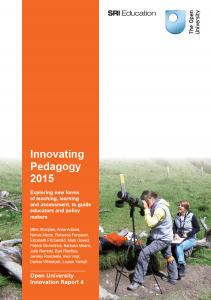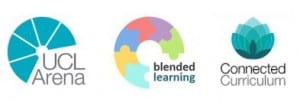Innovating pedagogy – 2015 trends report
By Clive Young, on 9 December 2015
Innovating Pedagogy 2015 is the latest annual report from the Open University highlighting new forms of teaching, learning and assessment with an aim to “guide teachers and policy makers in productive innovation”.
The scope is similar to the US Horizon reports, but presents a useful UK perspective. It is of course sometimes difficult to differentiate the meaningful from the merely modish in such futurology (see for example Matt Jenner’s analysis of Horizon’s trend-spotting). However such reports definitely have an impact on the discussion around technology in education, even if initially only at the level of “buzz-word bingo” for those in the know. A fellow learning technologist last week accused me of “incidental learning” when, during a pause in our teaching session, he caught me reading a random handout left over from some previous class.
The current crop is;
- Crossover learning – connecting formal and informal learning
- Learning through argumentation – developing skills of scientific argumentation
- Incidental learning – harnessing unplanned or unintentional learning
- Context-based learning – how context shapes and is shaped by the process of learning
- Computational thinking – solving problems using techniques from computing
- Learning by doing science with remote labs – guided experiments on authentic scientific equipment
- Embodied learning – making mind and body work together to support learning
- Adaptive teaching – adapting computer-based teaching to the learner’s knowledge and action
- Analytics of emotions – responding to the emotional states of students
- Stealth assessment – unobtrusive assessment of learning processes
A fascinating list with several novel concepts (to me anyway), the report gives a quick overview of why the OU thinks these are or may be important and includes handy links to further reading.
The authors also identify six overarching pedagogy themes that have emerged from the last four reports: Scale, Connectivity, Reflection, Extension, Embodiment and Personalisation.
 Close
Close










